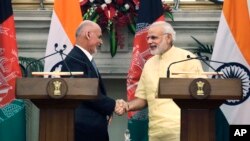India promised $1billion in development aid to Afghanistan Wednesday during Afghan President Ashraf Ghani's two-day trip to New Delhi.
Officials from the two countries also signed three agreements, including a treaty that would allow them to extradite criminals, economic offenders and people linked to terrorist activity.
The atmosphere for this visit was in marked contrast to the last time Ghani was in New Delhi. During a visit in April of last year, he received a cold reception. At the time, Ghani was courting India’s rival, Pakistan, in a bid to improve the security situation in Afghanistan. He was hoping Pakistan would use its influence to bring the Afghan Taliban to the table to negotiate peace in Afghanistan.
Pakistan says it has limited influence with the Taliban and cannot force them beyond a certain point without facing resistance.
Since then, the Afghan president appears to have given up on Pakistan and has tilted toward India, in a move that has irked Islamabad. Relations between Kabul and Islamabad have been on the decline just as Afghanistan’s relations with India have improved.
Terrorism challenge
This was the eighth meeting between the Afghan leader and Indian Prime Minister Narendra Modi, who have also been in frequent contact via telephone or video conferences.
“A large part of the discussion was devoted to the challenge of terrorism,” according to Indian Foreign Secretary S. Jaishankar about the Wednesday meeting.
The two sides agreed that the use of terrorism as a tool to achieve political objectives was “the single biggest threat to peace, stability and progress in the region and beyond,” according to a joint statement.
The statement added, “They called upon the concerned to put an end to all sponsorship, support, safe havens and sanctuaries to terrorists, including for those who target Afghanistan and India.” This was an apparent reference to neighboring Pakistan, whom both have accused of sponsoring or supporting terrorism in the region - charges Islamabad denies.
While the statement held references to “counter terrorism and strengthen security and defense cooperation,” it did not mention any specific defense aid that India might provide Afghanistan at this time.
In the past, India has been hesitant in providing Afghanistan with arms or military equipment, focusing more on development assistance, mostly under pressure from the United States, so as not to alarm Islamabad.
“However, this might not be the case in the future,” according to Suhasini Haidar, the diplomatic editor of The Hindu, India’s leading English language daily.
Gen. John Nicholson, the commander of U.S. and NATO troops in Afghanistan, in a visit to India last month, expressed hope that India would assume a greater role in security assistance in Afghanistan.
Regional connectivity
Separately, Afghan and Indian officials also stressed the need to expedite the implementation of a trilateral agreement with Iran, involving a port at the Iranian city of Chabahar, that would enhance regional connectivity for Afghanistan but also allow it to bypass its neighbor Pakistan, which has given it limited access for direct trade with India.
President Ghani recently threatened to block Pakistan’s transit trade to Central Asia through Afghanistan if it did not allow Afghanistan to trade with India through Pakistan, the shortest land route between India and Afghanistan.
Pakistan allows trucks carrying Afghan fruit to the Indian border but not to return with Indian goods.
President Ghani also accepted Indian Prime Minister Modi’s invitation to attend the inauguration of a ministerial conference in December of the Heart of Asia - Istanbul Process, a regional grouping led by Turkey to help resolve Afghanistan’s security and development challenges. This year's conference is set to take place in Amritsar, India.
